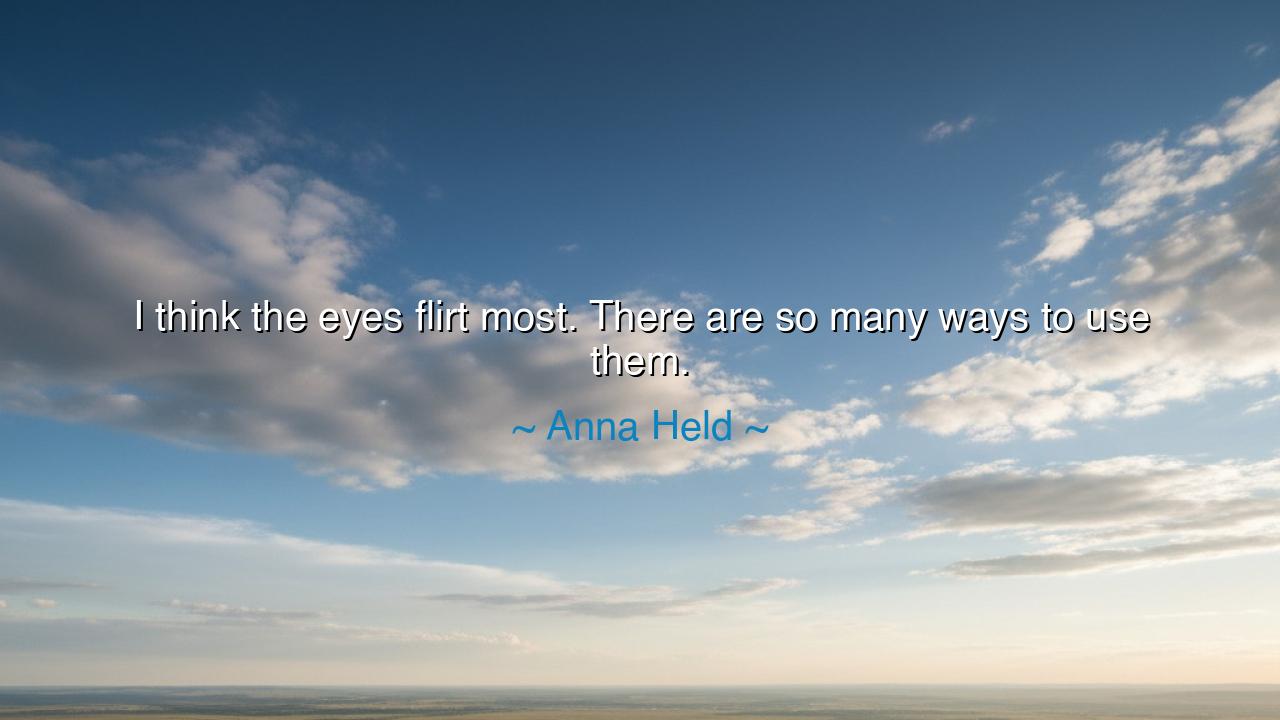
I think the eyes flirt most. There are so many ways to use them.






The words of Anna Held, the radiant star of the early stage, shimmer through time like a glance that lingers too long: “I think the eyes flirt most. There are so many ways to use them.” What seems, at first, a whisper of seduction is, upon deeper reflection, a revelation about the soul’s silent language — the ancient power of the eyes, those mirrors of spirit that speak without sound and reach across the distance between hearts. In her playful wisdom, Held reminds us that within every gaze lies a universe — the art of connection, persuasion, compassion, and even transformation.
To the ancients, the eyes were not mere organs of sight but windows of truth, portals through which the divine could peer into mortal hearts. They believed that a single look could bless or curse, heal or wound, bind lovers or unravel kings. In her quote, Held revives that belief, not as superstition but as awareness — for she knew the stage of life as both theater and temple. Her eyes, trained in the art of performance, became her instruments of power; yet her insight stretches beyond flirtation. She speaks of the many ways to use them — the ways of charm, of empathy, of strength, of honesty — the ways through which human beings reveal what their tongues cannot say.
Consider Cleopatra, queen of Egypt, whose eyes conquered where armies failed. Historians tell us that her beauty lay not in form but in presence — the magnetic force of her gaze. With her eyes, she spoke the language of destiny, bending the wills of Julius Caesar and Mark Antony alike. Yet her power was not mere seduction; it was mastery — the awareness that the eyes can express both affection and command, vulnerability and authority. Cleopatra understood, as Anna Held did, that the eyes are the sovereigns of expression, capable of crafting alliances or breaking hearts without a single word uttered.
Yet the power of the eyes is not reserved for queens or courtesans. Every soul wields it, knowingly or not. A mother’s gaze upon her child is a prayer without speech; a friend’s knowing look can calm storms more swiftly than counsel; even an enemy’s stare can reveal the weight of fear behind hatred. The eyes are the bridge between souls, the oldest form of communication that preceded speech and outlives language. Through them, truth and deception alike take form — for though the lips may lie, the eyes, in their depths, betray the heart.
In Anna Held’s time — the gilded age of theater and illusion — she embodied the art of the gaze. She was known to captivate entire audiences not through song alone, but through the play of her eyes, their light, their invitation. Her “flirtation” was not mere coquetry; it was artistry — the recognition that attention, affection, and emotion can be shaped through awareness. To “flirt” in this sense is to connect — to awaken curiosity, to remind another that they are seen. When she said, “There are so many ways to use them,” she spoke not just as a performer but as a philosopher of feeling.
From this wisdom arises a deeper lesson: To see is to honor, and to be seen is to be healed. In an age where eyes are often hidden behind haste and distraction, where glances are fleeting and screens divide hearts, Anna Held’s insight calls us back to the sacred art of presence. Look into the eyes of others with awareness. Let your gaze hold sincerity, not calculation; warmth, not indifference. Use your eyes to listen, to comfort, to inspire — not merely to entice. For every soul, however proud or wounded, hungers to be seen.
Thus, the teaching endures: Guard your gaze, and wield it wisely. Do not cast it carelessly, for it has the power to stir worlds within others. Let your eyes speak truth, courage, and tenderness; let them become instruments of empathy, not vanity. When you meet another’s gaze, do not look past them — see them, wholly and without armor. In doing so, you will practice the noblest form of flirtation: not the art of conquest, but the art of awakening humanity in another. And in that timeless exchange, you will rediscover what Anna Held knew well — that the eyes, when used with purpose and grace, are the most eloquent poets of the human soul.






AAdministratorAdministrator
Welcome, honored guests. Please leave a comment, we will respond soon